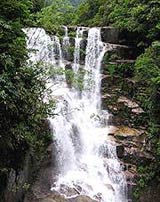China Archives of World Heritage
Mount Wuyi cctv.com 07-05-2004 11:00
cctv.com 07-05-2004 11:00
Bordering two southeastern provinces, Fujian and Jiangxi, Mount Wuyi became a world cultural and natural heritage site in 1999. The listing recognizes its ecological diversity and cultural history.
Mt. Wuyi鈥檚 ecology has survived from before the Ice Age around three million years ago. The importance of its biodiversity has been appreciated since the 16th century. More than sheltering some of the rarest plant and animal species, Mount Wuyi was the capital of an ancient vassal kingdom and home to an important school of Chinese philosophy. Neo-Confucianism was developed by Zhu Xi in the 12th century. Today鈥檚 documentary explores the ecological mystery of Mount Wuyi, and its unique history of more than 2000 years.
|

|
|
|
With its growing list of species not found anywhere else in the world, Mount Wuyi is renowned for its biodiversity. But the west came to know the mountain鈥檚 philosophy even earlier than they savored its tea. Zhu Xi, a philosopher based in Mount Wuyi around the 11th century, developed a naturalistic school of Confucianism. His thought reached the west in the 16th century through an Italian translation. Perhaps it was the mountain鈥檚 natural beauty which gave birth to Zhu Xi鈥檚 philosophy and attracted religious sects throughout China鈥檚 ancient history.
It was this imperial order that helped Mount Wuyi survive the next thousand years. It still has 95.3 percent of its forest cover, and many historical and cultural ruins had remained undiscovered until the latest archaeological findings. In 1958, some potsherds were unearthed around Mount Wuyi. Chinese archaeologists explored the area and found more artifacts. The history of an ancient and forgotten city was gradually brought to light.
The historical value of the ancient city at Wuyi should not be measured by its physical size: the natural and cultural value of Mount Wuyi is enormous. The mountain鈥檚 natural environment and cultural foundation are a perfect match. Mount Wuyi seems to be exactly the model that Zhu Xi鈥檚 philosophy aims for鈥攈armony between nature and man. The protection of sites on the world cultural and natural heritage list is also aimed at maintaining that difficult balance.
Editor:Wang Source:CCTV.com